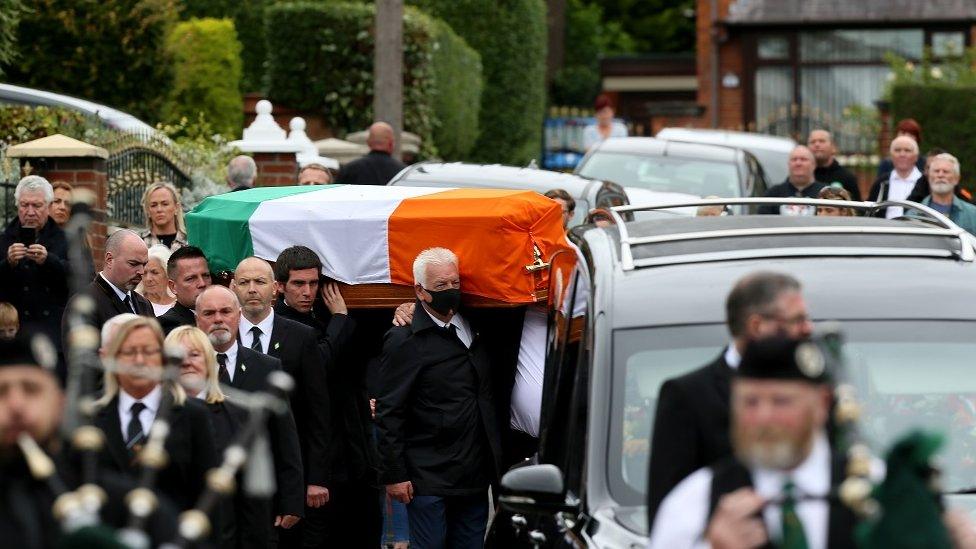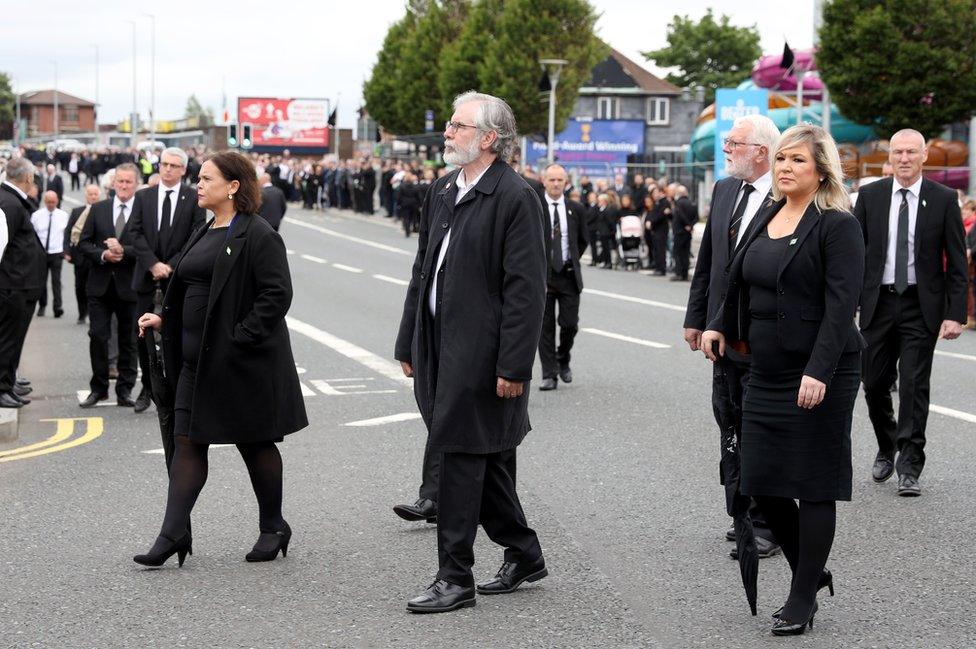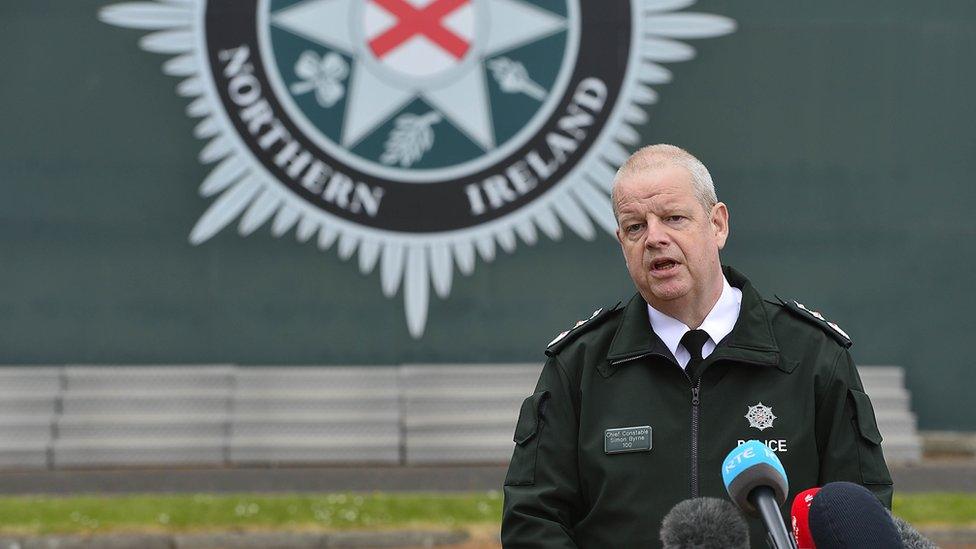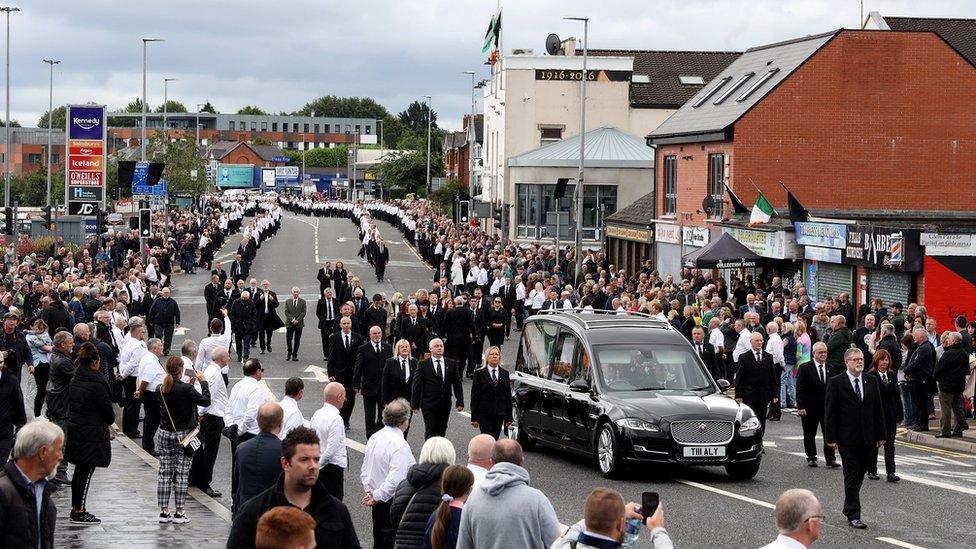Bobby Storey funeral: Watchdog report finds no police bias
- Published

Bobby Storey's funeral caused a row at Stormont over potential breaches of Covid-19 regulations
A report into how police handled the funeral of senior republican Bobby Storey has found no bias.
A review was launched after it was announced prosecutions could not be brought against 24 Sinn Féin politicians.
It was conducted by Her Majesty's Inspectorate of Constabulary (HMIC).
It found there were "grounds for criticising the PSNI (Police Service of Northern Ireland) approach" but they were not "especially serious failings".
"They do not approach the level at which censure of individual officers, or resignations, would be justified."
PSNI Chief Constable Simon Byrne welcomed the report and said the police would learn lessons but that he hoped "we can move on now".
DUP assembly member (MLA) Mervyn Storey, whose party had called for Mr Byrne to resign, said there should be a further investigation into his actions and those of senior officers.
About 2,000 people attended Mr Storey's funeral in Belfast last June at a time when rules placed strict limits on funeral numbers and public gatherings.
The political fall-out saw the DUP and Ulster Unionists call for the resignation of Mr Byrne.
Deputy First Minister Michelle O'Neill was among those questioned as part of a six-month police investigation following the funeral.

Mary Lou McDonald, Gerry Adams and Michelle O'Neill were among the senior Sinn Féin members at the funeral
Justice Minister Naomi Long, who backed Mr Byrne, asked for the external review on behalf of the policing board.
The report, published on Monday, levelled no major criticisms at the PSNI.
It found there was "nothing to suggest that there was any bias towards one community or another in the way the PSNI dealt with this funeral".
"We have seen nothing to suggest a funeral of a leading figure in the loyalist community wouldn't have been approached in the same way."
'Arguably insurmountable problem'
It added: "The regulations at the time of the funeral were both confusing and controversial.
"That alone posed an arguably insurmountable problem for the PSNI."
In March, the Public Prosecution Service (PPS) said it could not recommend prosecutions due to a lack of clarity around the regulations and because of prior engagement between Sinn Féin and the PSNI during funeral planning.
We have to police sensitively - PSNI Chief Constable Simon Byrne
The HMIC report backed the PPS over this decision.
"We find the PPS arguments wholly persuasive," it said.
"We have taken our own, independent legal advice, and have reached the same conclusion: we are not confident that any of the funeral attendees could be shown to have committed an offence under the regulations."
In regards to conversations between the police and Sinn Féin's Gerry Kelly ahead of the funeral, the report said: "We saw nothing to suggest that the manner in which he engaged with the PSNI was anything other than open and professional."
However, it also said that "Mr (Gerry) Kelly chose not to share his account of his conversations with the PSNI commanders in the run-up to the funeral with us."
Mr Kelly told BBC NI's Evening Extra that his dealings with the HMIC were "open and professional".
"The issue here, I think, is that the report has come in, the DUP in particular simply do not want to accept it, even though it's the third report.
"At some stage they need to accept that this has been reported on, reported on and reported on."
Speaking on Radio Ulster's Talkback, the head of HMIC, Matt Parr, said: "The police priorities were that it wasn't a major violent incident, serious disorder, that there weren't really overt displays of paramilitary force as we've seen in some other funerals.
"And I think against that they put enforcement of the regulations as the third priority.
"That's what's caused all the outcry and I understand that, but I think what we're saying is that in the particular context of Northern Ireland it's kind of understandable why they had that set of priorities."

Reacting to the report, Mr Byrne said he welcomed the findings and that the police would learn lessons.
He added: "I'd like to think we can move on now."
The chief constable repeated that he would not step down in the wake of unionist criticisms.
"If every time there's criticism, the chief, whoever it is, steps aside, we won't create continuity and we'll make that position, the office of chief constable, vulnerable, so I'm not resigning," he said.
Speaking at a press conference on Monday afternoon, Mr Byrne explained that police would have been criticised if they had taken a different approach on the day of the funeral.
"Knowing what we know now, we would have been heavily criticised, even more heavily criticised, had we used force, for example, to try to block the Falls Road or indeed clear people from it.
"We have to police sensitively, proportionately, and within the law, and that's what we tried to do."
'No winners' in this process
The justice minister, Mrs Long, said police have to deal with each set of circumstances based on the challenges that they anticipate.
"So it's not about policing everything the same way, it's about policing everything the way it needs to be policed in order to get as fair an outcome as possible," she said.
"I think that is what, by and large the PSNI has been found to do in this report."
DUP assembly member Mervyn Storey said the report was a "missed opportunity for full accountability" and that there should be a further investigation into the actions of the chief constable and senior officers.
He added: "It is now imperative that the Policing Board establishes a process to examine the impact of police failings on support for the police and rule of law, not just in the context of the Storey funeral but in relation to allegations of two-tier policing in the policing of parades and protests."
Ulster Unionist policing spokesman Mike Nesbitt called on the PSNI to "review the nature of its relationship with Sinn Féin" and said there had been "no winners from this entire process".
The SDLP's Dolores Kelly said the report "confirms the invidious and impossible position that police officers were placed in during the Bobby Storey funeral".
Alliance Party Policing Board member John Blair said the report showed that "reaction from some political quarters in relation to this funeral was disproportionate in the extreme".
Inspectors assessed whether the PSNI's approach "was within the parameters of policing standards" for the report.
The report was published after Mr Parr, briefed Mrs Long and a closed-doors session of the Northern Ireland Policing Board.
- Published6 May 2021

- Published2 April 2021

- Published14 May 2024
